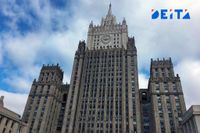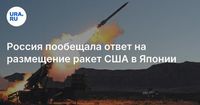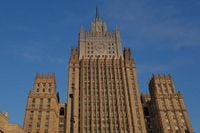In a significant escalation of diplomatic tensions, Russia has issued a stern warning to Japan regarding the potential deployment of American medium-range missiles on Japanese soil. Lyudmila Vorobyova, the Director of the Third Asian Department of the Russian Foreign Ministry, communicated this caution, emphasizing the possible implications for regional security.
According to Vorobyova, Russia has long been concerned about Japan's cooperation with the West, particularly in military-technical matters. “If as a result of this cooperation American medium-range missiles appear in Japan, we will be forced to take the necessary countermeasures to strengthen our defense capabilities to neutralize threats to Russia's security,” she stated, conveying the gravity of the situation. This declaration underscores Russia's apprehension about the strategic balance in the Asia-Pacific region, suggesting that measures to enhance national defense will be intricately designed to address emerging threats.
In her comments, Vorobyova pointed out that specific countermeasures would be developed by Russian authorities, aligning them with the nation’s long-term strategic interests. She articulated a broader concern, stating, “The appearance of American medium and shorter-range missiles in different parts of the world, including the Asia-Pacific region, does not contribute to global stability but only increases the level of conflict and strategic risks.” This sentiment reflects a prevailing fear within the Kremlin regarding the ever-growing arms race facilitated by foreign militarization in proximate territories.
However, Japan has firmly asserted its position against hosting American missiles. Earlier this year, the Japanese Embassy in Russia reiterated that Tokyo does not plan to allow such deployments. In a similar vein, Akira Muto, the Japanese Ambassador to Russia, reiterated last November that discussions between Tokyo and Washington concerning missile placement have not occurred. This duality in messaging highlights Japan's attempt to balance its security alliances with concerns about regional stability.
In light of Russia's concerns, it is crucial to consider the broader context of military exercises involving NATO in the Asia-Pacific region. Vorobyova also expressed alarm over the increase of NATO exercises in the area, arguing that such activities compound security dilemmas and elevate tensions. She believes that the influx of foreign military presence and operations may further complicate the security landscape in Asia.
Japan's historical context also plays a vital role in its current diplomatic stance. Having faced significant devastation during World War II, Japan remains acutely aware of the ramifications of military escalations in its vicinity. This historical backdrop informs its conservative approach toward military alignments, preferring diplomacy over aggressive posturing.
As the situation develops, the implications of possible missile deployments will continue to reverberate through international relations in the region. The symbiotic relationship between military preparedness and diplomatic negotiations will undoubtedly shape future interactions between Russia and Japan.
In conclusion, while Russia has confirmed that it respects other nations' rights to fortify their security, the Mathew T. O’Brien emphasized, “We have repeatedly warned Tokyo that the deployment of American medium-range missiles on Japanese territory would require us to take measures to strengthen our own defense to neutralize potential threats to Russia.” This firm stance seeks to safeguard Russia's interests while contributing to a contentious geopolitical landscape in East Asia.



